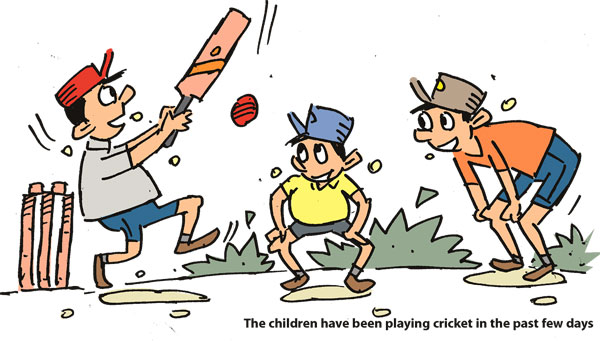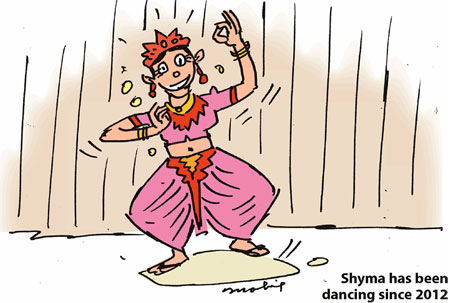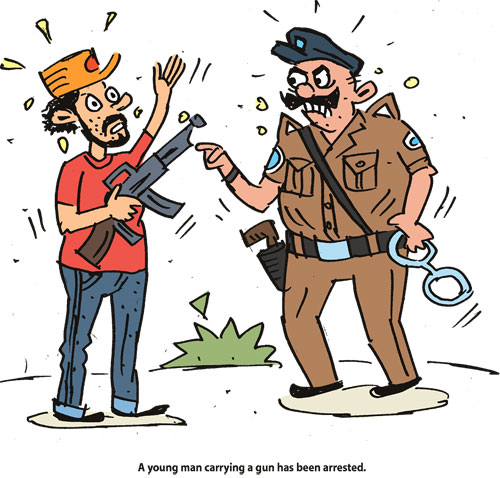|
 by
R. S. Karunaratne by
R. S. Karunaratne
Present perfect progressive tense
We use the present perfect progressive tense to say how long things
have been continuing up to now. We make the present perfect progressive
tense with 'have / has + been + -ing.'
Cyril has been learning English for three years.
The Smiths have been living in Colombo since 1975.
Lakshman has been working as a journalist for 30 years.

It has been raining all day.
Have you been waiting long?
We use the present perfect progressive tense to say how we have been
filling our time up to now.
The children have been playing cricket in the past few days.
I've been travelling, so I couldn't write to you.
Have you been repairing the car since early morning?
Nethmi has been playing the piano for one hour.
Bryan has been playing volleyball since 3 p.m.
We use the present perfect tense mostly for unfinished actions
continuing up to now.
Father has been writing a short story since breakfast.
Laura has been learning Latin for three years.
The children have been decorating the house since morning.
The minister has been viewing the exhibits since the opening of the
exhibition.
Shyma has been dancing since 2012.
We use the present perfect progressive tense to say how much or how
often.
They have been travelling all this year.
How long have you been learning Bharatha Natyam?
We have been buying milk-food for a long time.
How long have you been driving now?
Have you been reading novels for a long time?
[Activity]
Make present perfect progressive sentences using the words given in
brackets. Check your answers with the key.
1. Srima started learning French in February. Now it's October. (for)
.....................................................
2. It started raining in the morning. Now it's evening. (since)
.....................................................
3. Mary started making a doll on Friday. Now it's Sunday. (for)
.....................................................

4. Father started cleaning the garden at 8 a.m. Now it's 11 a.m.
(for)
.....................................................
5. Brenda started working at a press in 1990. She is still working
there. (since)
......................................................
6. Cyril started making bricks when he was 25. Now he is 50. (for)
......................................................
7. The children started waiting for the school van at 6 a.m. They are
still waiting. (since)
........................................................
8. The prices of electrical goods started going up in January.
(since)
........................................................
9. Nelum started following a computer course in February. Now it's
October. (for)
........................................................
10. My brother started working at a factory in 2000. He is still
working there. (since)
.........................................................
Key:
1. Srima has been learning French for 10 months.
2. It has been raining since morning.
3. Mary has been making a doll for three days.
4. Father has been cleaning the garden for three hours.
5. Brenda has been working at a press since 1990.
6. Cyril has been making bricks for 25 years.
7. The children have been waiting for the school van since 6 a.m.
8. The prices of electrical goods have been going up since January.
9. Nelum has been following a computer course for nine months.
10. My brother has been working in a factory since 2000.
Starters:
How to use determiners
[Part 1]
We use 'a' before words beginning with a consonant sound.
Nimmi borrowed a book from the school library.
Nayana is looking for a job.
We are going to climb a hill during the holidays.
A friend of mine studies at Kelaniya University.
A young man carrying a gun has been arrested.
Some words that begin with the letter 'u', which is a vowel, have a
consonant sound. So, we use 'a' before them.
Martin Wickremasinghe did not study at a university.
A union member is waiting to meet the director.

"That's a useful idea," the teacher said.
Have you ever seen a unicorn?
The postman wears a uniform.
We use 'an' before words beginning with a vowel sound.
Grandmother bought an egg.
The child ate an apple.
Do you always carry an umbrella?
An uncle helped him to join the circus. The uniform belongs to an
American soldier.
We use 'an' before some words beginning with 'h' which is not
pronounced. In grammar we say 'h' is mute.
Sarala went home an hour earlier than usual.
An honest worker will never steal money from his employer.
We use 'a' or 'an' in expressions of frequency to answer questions such
as "how much, how many, how fast" and "how often."
A: How much do you earn?
B: Rs 20,000 a month.
A: How often do you go to the library?
B: Once a week.
A: How fast can you drive?
B: Forty kilometres an hour.
A: How often does your father shave?
B: Once a day.
A: How fast can you walk?
B: Four kilometres an hour.
A: How often do you have examinations?
G: Twice a year.
A; How often do you play cricket?
B: Twice a week.
Sometimes we use a determiner after 'what.'
What a lovely dress!
But: What lovely dresses!
What an awful picture!
But: What awful pictures!
What a beautiful room!
But: What beautiful rooms!
What a nice cup of coffee!
But: What nice cups of coffee!
What a disappointing programme!
But: What disappointing programmes!
We do not use 'the' in the following expressions:
We go to church.
We walk to temple.
We go to school.
We go to work.
Mother goes to market.
Father is driving home.
We go to university.
We go to bed.
We go to hospital.
We stay in bed.
We stay in hospital.
We stay in prison.
We stay at school.
We stay at home.
We do not use 'the' with games and sports.
We play cricket.
We play volleyball.
We play tennis.
My sister likes swimming.
We do not use 'the' with subjects.
He has studied philosophy.
I teach English.
she teaches political science.
We learn economics.
We do not use 'the' with languages.
Do you like to learn German?
She learns French.
Bhikkhus learn Pali.
We do not use 'the' with meals.
What time do you have breakfast?
I had lunch at home.
We are late for dinner.
[Activity]
Put in 'the' where necessary and check your answers with the key.
1. In my room ....... bed is in a corner.
2. I usually go to ............ bed at 10 p.m.
3. Father leaves ......... home at 6 a.m.
4. ....... work I do is boring.
5. I left ........ school in 2000.
6. She goes to ......... work by train.
7. My brother is at ......... home.
8. We study ......... English literature.
9. Do you play .......... tennis?
10.We have .......... lunch at 1 o'clock.
Key:
1. the 2. -- 3. -- 4. The 5. -- 6. -- 7. -- 8. -- 9. -- 10. -- |

